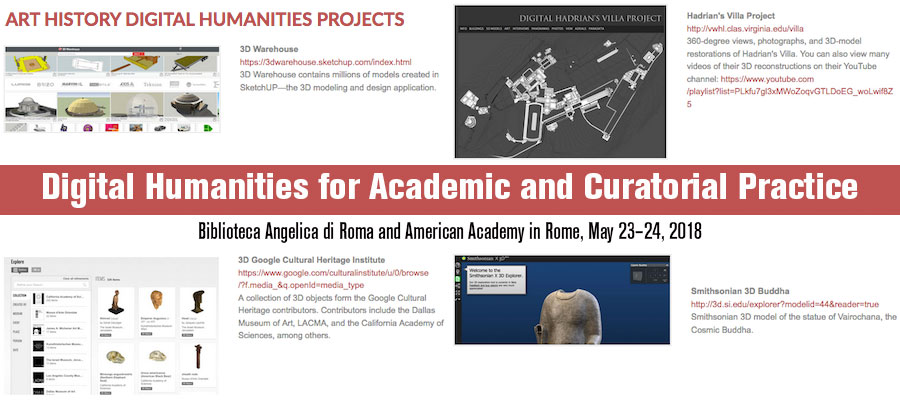Digital Humanities for Academic and Curatorial Practice, Biblioteca Angelica di Roma and American Academy in Rome, May 23–24, 2018
The Digital Humanities have challenged all disciplines of Art History to engage with new interdisciplinary methodologies, learn new tools, and re-evaluate their role within academia. In consequence, art historians occupy a new position in relation to the object of study. Museums have been equally transformed. The possibilities of creating virtual realities for lost/inaccessible monuments poses a new relationship between viewer and object in gallery spaces. Digital Humanities interventions in museums even allow us to preserve the memory of endangered global heritage sites which cease to exist or are inaccessible (celebrated examples including the lost Great Arch of Palmyra reconstructed with a 3D printer). Curatorial practices are now trending towards a sensorial and experiential approach.
Is the role of Digital Humanities, in academic as well in museum settings, to "reveal" the object itself, through empirical display of extant material, or to "reconstruct" something of the original experience of the object to engage spectators? Can we propose a reconciliation between these two 'poles'?
The Sixth International Day of Doctoral Studies promoted by RAHN aims to investigate the role of Digital Humanities by promoting a dialogue between the protection of cultural heritage sites, museology, the history of art, and the digitalization of Big Data. We are accepting papers that engage with particular dimensions of the dichotomy between 'Revealing' and 'Reconstructing.' Possible topics include:
- How can the Digital Humanities preserve our global heritage?
- Do Digital Humanities interventions make historical material more accessible to non-specialists?
- What are the moral obligations of the Digital Humanities within the museum context?
- How is Digital Humanities changing the practice of Art History? Do they provide a more empirical alternative to connoisseur/style-based approaches? The call for papers is open to art and architectural history graduate students and those working in the field of Digital Humanities.
We invite candidates to submit 15-minute reports that, by means of study cases or theoretical observations, point to the centre of this methodological practice. The conference will take place in Italian and English and papers will be accepted in both languages.
